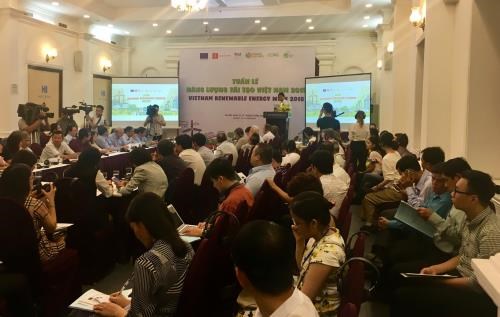Renewable energy aids electrification target achievement
A workshop on renewable energy development to meet rural electrification targets and energy access was held in Hanoi on August 21 as part of the Vietnam Renewable Energy Week 2018 underway in the country.
 At the workshop (Source: VNA)
At the workshop (Source: VNA)Hanoi (VNA) – A workshop on renewable energy development to meet rural electrification targets and energy access was held in Hanoi on August 21 as part of the Vietnam Renewable Energy Week 2018 underway in the country.
The event was co-organised by the Vietnam Sustainable Energy Alliance (VSEA) and the Climate Change Working Group (CCWG).
The rural electrification programme for the 2013-2020 period set a target of providing electricity for all households in the countryside, islands, and remote or mountainous areas by 2020, said Dinh Duy Phong from the Electricity and Renewable Energy Authority (EREA) at the workshop.
As of 2015, some 40 communes (or 70.1 percent) had been connected to national grid, while over 165,800 households (accounting for only 17.7 percent) had access to power, he noted.
Although the programme has had to encounter many challenges, independent and off-grid renewable energy projects are emerging as economically-efficient solutions widely used by many communities, Phong added, mentioning two villages in the Tinh Bien border district, in the Mekong Delta province of An Giang, as some of the first having all households using solar power.
Assoc. Prof., Dr. Le Anh Tuan, Deputy Director of the Research Institute for Climate Change at Can Tho University, said the installation of solar panels in homes is the right path of response to climate change, especially given the specific ecological conditions in the Mekong Delta.
Developing renewable energy – such as solar, wind, biomass, tidal, and geothermal power – is suitable for this region as in the long run, the price of renewable energy is not higher than that of thermal electricity. Meanwhile, it is costly to develop thermal power in the Mekong Delta since the price of this power type grows approximately 2 percent annually, Tuan said.
He added that renewable energy may look more expensive in Vietnam but in the future (around 2030) its price will stay at the same level as the thermal electricity, not to mention no environmental impacts.
Nguy Thi Khanh – Executive Director of the Green Innovation and Development Centre (GreenID), a member of VSEA – believes that to fulfil the rural-electrification targets, it is not only technical matter but also how to access funding. This remains the biggest barrier in accessing green technology, which provides green solutions like solar panels or ways to save power at home.
We look forward to a helping hand from financial providers or green development programmes in Vietnam that can support cities and communities in the implementation, said Khanh.
She also unveiled that the GreenID will launch a renewable energy project that draws the initial participation of 100 households in Hanoi.
Co-hosted by the VSES and CCWG, the Vietnam Renewable Energy Week 2018 is taking place in Hanoi, Ho Chi Minh City, and Can Tho from August 21-26 to create a forum for multi-stakeholders to find solutions for removing obstacles and accelerating renewable energy development for all in Vietnam.
It also aims to raise public awareness of the feasibility and benefits of renewable energy and call for concrete actions.
Renewable energy plays an important role in Vietnam’s rural development, helping to create greater income for farmers and modernise agricultural production.
Apart from bringing economic benefits to rural areas, renewable energy is also a domestic energy source that can help Vietnam become more proactive in its energy supply and reduce its dependence on fluctuations in global oil, coal, and gas prices.
In 2015, the Prime Minister approved a renewable energy development strategy by 2030 with a vision towards 2050, which targets an increase in the ratio of power generated from renewable energy to 32 percent by 2030 and 43 percent by 2050. –VNA












